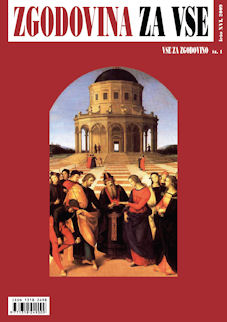THE STRUGGLE OF SLOVENE BOYS AND GIRLS FOR FREEDOM
The intertwining and clashing of patriarchal constraint with love and the consensual marital principle in Slovenia in the Late Middle Ages
After the formal triumph of the consensual principle in the ecclesiastical teachings of the Church in the 12th century, the verification at the Council of Trent in 1563 and its successful social implementation, the more determined young men were able to assert their wishes and particularly love in their quest for a spouse. However, with the rise of the absolutist state in the 17th and 18th centuries, intergenerational tensions increased. This eroded not only the materialist essence of matrimony, which was usually negotiated between the bride and the bridegroom’s parents, but also the essence of the absolutist state with the emperor as the patriarch. This resulted in an apparent paradox: the Church supported the young people, while the state supported the parents. Support, however, was not always solid. A testimony to this is the selfwilled engagement and the intended marriage of Marija Dizma Count Barbo-Waxenstein from 1760-1764, who together with his beloved Ivana Nepomuška Baroness Billichgratz withstood social demands as embodied in his father Jošt Vajkard. However, the favourable end of the affair for the couple came so late that the previously loudly extolled love emotions among aristocratic circles had already begun the retreat to intimacy. In Carinthia, a system of religious-moral rigorism was being implemented. Love and marriage, even though the latter was formally free, could not be outlived past the standard material (preservation of property) and moral demands, i.e. respect of but not also absolute subordination to parents.
“WARTIME WEDDINGS” DURING THE FIRST WORLD WAR
The article deals with wartime weddings during the First World War. The data about these weddings is based on the parochial registers of the town parishes of Ljubljana and the notices in the dailies Slovenec and Slovenski narod. The author presents the dimensions of “wartime weddings” and the motives for getting married, including the following: from the opportunity to become eligible for social support to the formalization of long-term non-marital relationships and the recognition of illegitimate children.
GUEST-HOUSES IN JESENICE BETWEEN THE END OF THE 19TH CENTURY AND THE SECOND WORLD WAR
The article describes everyday-life in guest-houses around Jesenice between the end of the 19th century and the start of the Second World War. It features guest-houses as important centres of social life, as places for meeting people, having fun and relaxing after a tiring day, as well as places of tippling and “immorality”. The clientele of a particular guest-house provided a good reflection of the national and political divisions in Jesenice. The division of guest-houses into the more eminent ones, on the one hand, and those for the “commoners”, on the other, is also indicative of the social differences in this industrial settlement.
“WE ARE PROBABLY ON THE BRINK OF THE MOST HORRIBLE TOTAL WAR”
The doctrines of the Second World War from the point of view of Slovene politics in the years 1939-1941
Slovene politicians addressed the question of military doctrine soon after the start of the new global conflict. Both the Liberal and the Catholic camps believed that the war was total in character; at the same time, they pointed out another key feature of the new military conflict – the Blitzkrieg principle. Both camps, and the Socialist wing of the Marxist camp in particular, stressed the importance of modern military means in the new war. They particularly pointed out the role of the air force, paratroopers, motorized units, naval mines and submarines. Meteorological conditions were likewise considered an important factor in the successful execution of military operations, as well as the dangerous effects of propaganda, psychological warfare and the role of radio in it. The Liberals also advocated the doctrine of all-round support of the civil population towards the armed forces (the army is the nation), while the Socialists warned about warfare whose purpose was to deliberately exhaust the enemy’s economic power and decimate the soldiery in a military conflict. In the years 1939-1941, the Communists addressed the question of military doctrine from the point of view of their revolutionary goals, which included organization, preparation and execution of an armed rebellion and a takeover of power that would be based on guerrilla or partisan-type fighting. This was the ground on which they conducted partisan warfare in the years 1941-1945.
“YOU ARE NOTHING; YOU ARE LESS THAN THE STENCH OF BOHINJ SHIT!”
The insult to honour and defamation in the years 1937–1950
The article deals with insult to honour before, during and after the Second World War. It is restricted to the court circuits of Kranjska gora and Radovljica and the court circuit of Jesenice that was (temporarily) united after the war; the article is based on the files of the competent courts.
The high number of lawsuits shows that litigation because of honour was common in the pre-war period. During the war, as expected, people had less time for these issues; immediately after the war, however, the percentage of litigations because of injured honour rose once again. The majority of the charges regarding insult to honour were connected with sexuality; among the defamation charges, larceny was the most common.
Insult of the authorities and the state soon grew from insult and defamation to violation of public law and order, which is why the article only features “milder” cases. The cases with a political background represent a special category because they provide evidence of the most current contemporary issues. Before the war, for example, “political” insults commonly occurred during overheated electoral campaign events. After the war, when political life gradually died away, insults with a political basis turned into a direct attack on the authorities.
The war period and the events related to it left many traces on people and their mutual relationships, which also manifested itself in reproaches and insults. Insults and defamations on the basis of wartime loyalties became an important category of accusations. In this respect it needs to be pointed out that, in the first few years after the war, court verdicts were often obviously in line with the “spirit of the time”.
Comparison between the sexes shows us that men sued more often than women before the war; men were sued many more times because of insult to honour. After the war, unlike in the pre -war times, women defended their honour before the court more often; at the same time, the number of women who were sued because of insult to honour and defamation became similar to that of men.
“THEY LEFT EVERYTHING BEHIND AND LEFT OVERNIGHT “.
Illegal immigration from Posočje to Italy after the Second World War in the light of oral testimony
The article focuses on Posočje in the period after the Second World War, when it experienced mass migration within Slovenian ethnic territory and also across the border. Following the premise that individuals are not only passive observers but also active co-creators of their time, the author gives ear to some “invisible” individuals who belonged to illegal emigration currents towards Italy. With the help of oral testimony from émigrés and their contemporaries from Posočje, she tries to present the situation in contemporary society that stimulated emigration. At the same time, she analyses their decision to emigrate. The testimonies reveal that the decision to emigrate was based on various motives. It is precisely because of this fact, which was based on observation of migration processes at the personal level, that it is necessary to reduce the absolute importance of political and economic denominators as the reasons for emigration. At the same time, this questions the universality of official designations of émigrés.
ECONOMIC CRIME: “THE DARK SIDE OF THE CULTURAL AND TECHNOLOGICAL PROGRESS OF MANKIND”
The article deals with the problem of economic crime in Slovenia during the transition from one socio-political system to another. The author explains and defines the notion of economic crime, statistically presents its development and touches upon the most resonant business scandals of this period in Slovenia. Transition triggered a number of processes that made possible many malversations and other forms of economic crime. The author pays special attention to the process of privatization of social ownership as the central problem in Slovene economic transition.

